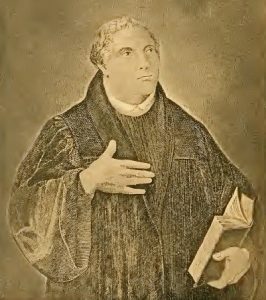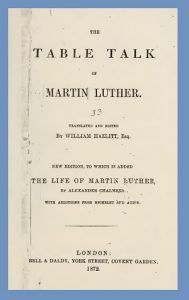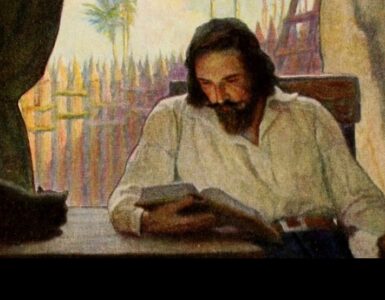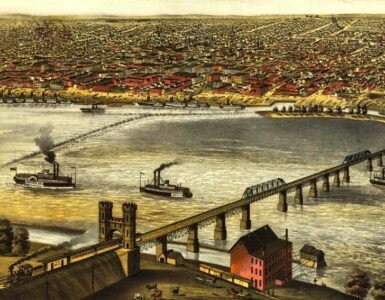 One of Martin Luther’s works from his multitude of writings is titled Table Talk. It includes observations he made while at table with colleagues and friends. Luther did not write Table Talk, but it contains his words as they were copied down by some of those who heard his off-the-cuff comments while enjoying food from his wife Katherine’s hearth. A problem with some of his remarks, because he was shooting from the hip and, well, because he was Luther, is that they are what might be called crude. Please note that none of the quotes below fit within the crude category. Because of Luther’s sometimes earthy language, Table Talk has been published in editions containing selections deemed suitable for all audiences. The wonderful American edition edited and translated by Theodore G. Tappert, volume 54 in Luther’s Works, is also a select edition, but it includes some of his not-so-polite comments.
One of Martin Luther’s works from his multitude of writings is titled Table Talk. It includes observations he made while at table with colleagues and friends. Luther did not write Table Talk, but it contains his words as they were copied down by some of those who heard his off-the-cuff comments while enjoying food from his wife Katherine’s hearth. A problem with some of his remarks, because he was shooting from the hip and, well, because he was Luther, is that they are what might be called crude. Please note that none of the quotes below fit within the crude category. Because of Luther’s sometimes earthy language, Table Talk has been published in editions containing selections deemed suitable for all audiences. The wonderful American edition edited and translated by Theodore G. Tappert, volume 54 in Luther’s Works, is also a select edition, but it includes some of his not-so-polite comments.
 Even though the Tappert edition is a good version, because of copyright issues the edition used for the selections below is The Table Talk of Martin Luther as translated and edited by William Hazlitt, which includes a biography of Luther and was published in London by Bell & Daldy in 1872. Each quotation below has Roman numerals in parentheses at its end which refers to the sequential numbering used by Hazlitt for organization. In some cases the quotes were modified by Presbyterians of the Past for clarity and some archaic English has been updated. Even though Hazlitt is not the best edition, the quotes selected give readers a sense of Luther’s more casual yet still beneficial comments. However, for a very good edition of Table Talk, see Tappert’s which provides Luther’s comments in chronological order with their dates as well as clarification and source comments.
Even though the Tappert edition is a good version, because of copyright issues the edition used for the selections below is The Table Talk of Martin Luther as translated and edited by William Hazlitt, which includes a biography of Luther and was published in London by Bell & Daldy in 1872. Each quotation below has Roman numerals in parentheses at its end which refers to the sequential numbering used by Hazlitt for organization. In some cases the quotes were modified by Presbyterians of the Past for clarity and some archaic English has been updated. Even though Hazlitt is not the best edition, the quotes selected give readers a sense of Luther’s more casual yet still beneficial comments. However, for a very good edition of Table Talk, see Tappert’s which provides Luther’s comments in chronological order with their dates as well as clarification and source comments.
BY BARRY WAUGH
See also on this site regarding Martin Luther, Reformation Day 2015, B. B. Warfield on Luther’s Theses, Reformation 500th, Remembering the 400th, and Reformation Day 2015, Augustine’s Quest for Rest in His Confessions. An English copy of the theses edited by the author of this site is available in PDF by pressing the button.
Martin Luther on the Word of God
No greater mischief can happen to a Christian people than to have God’s Word taken from them, or corrupted such that they no longer have it pure and clear. God grant us that we and our descendants be not witnesses of such a calamity. (XII)
Oh, how great and glorious a thing it is to have before one the Word of God! With it we may at all times feel joyous and secure. We need never be in want of consolation, for we see before us, in all its brightness, the pure and right way. He who loses sight of the Word of God falls into despair; the voice of heaven no longer sustains him; he follows only the disorderly tendency of his heart and worldly vanity, which lead him on to his destruction. (XX)
A fiery shield is God’s Word. It is of more substance and purer than gold, which, tried in the fire, loses nothing of its substance but resists and overcomes all the fury of the fiery heat. Even so, he that believes God’s Word overcomes all and remains secure everlastingly against all misfortunes, for this shield fears nothing, neither hell nor the devil. (XXXVI)
As in the world a child is an heir only because it is born to inherit, likewise faith only makes such to be God’s children who are born of the Word which is the womb wherein we are conceived, born, and nourished. … Now, as through such a birth we become God’s children, wrought by God without our help, even so we are also heirs, and being heirs are freed from sin, death, and the devil to inherit everlasting life. (LVI)
A Thought on Psalm 2
The second Psalm is one of the best Psalms. I love that Psalm with all my heart. It strikes and flashes valiantly among kings, princes, counsellors, judges, and so on. If what this Psalm says is true, then the allegations and aims of the papists are all lies and folly. If I were as our Lord God and had committed the government to my son, as he did to his Son, and these vile people were as disobedient as they now be, I would bash the world to pieces. (CXI)
The Wisdom of the World
The highest wisdom of the world is to busy itself with temporal, earthly, and ephemeral things. When these fail, the world says, “Who would have thought it?” But faith is a certain and sure expectation of that which a man hopes for, having no doubt of that which is of yet not seen. A true Christian does not say, “I had not thought of it,” but is most certain that the beloved cross is near at hand, and is thus not afraid when it goes ill with him and he is distressed. But the world, and those who live secure in it, cannot bear misfortune for they go on continually dancing in pleasure and delight, like the rich glutton in the gospel who would not give scraps to poor Lazarus, but Lazarus belongs to Christ and will take his part with him. (CXLVIII; Luke 16:19-31)
Wealth
Wealth has two properties—first, it makes us secure when things go well for us, then we live without fear of God at all, but then secondly, when it goes poorly for us, we then tempt God, flee from him, and seek another god. (CLXI)
Faith and justification
Faith is not only necessary because thereby the ungodly become justified and redeemed before God with their hearts settled in peace, but it is also necessary in every other respect. St. Paul says, “Now that we are justified by faith, we have peace with God through our Lord Jesus Christ.” (CCCI; Romans 5:1)
Christians Must be Armed with the Word of God
A Christian must be well armed, grounded, and furnished with verses from God’s Word to stand and defend religion and himself against the devil in order to avoid embracing other doctrine. (CCCIX)
The Lord’s Prayer
The Lord’s prayer binds the people together, knitting them one to another, so that one prays for another, and then together one with another. It is so strong and powerful that it even drives away the fear of death. (CCCXXXVIII)
A Good Preacher
A good preacher should have these properties and virtues—first, teach systematically; secondly, a good sense of humor; thirdly, eloquence; fourthly, a good voice; fifthly, good memory; sixthly, know when to end the sermon; seventhly, certainty of his doctrine; eighthly, should endeavor to engage body, blood, wealth, and honor in the Word; and ninthly, should endure being mocked and jeered by every one. (CCCC)
The Lord is God of the Humble
The Lord our God is a God of humble and perplexed hearts that are in need, tribulation, and danger. If we were strong, then we would be proud and haughty. God shows his power in our weakness, for he will not quench the burning flax, neither will he break in pieces a damaged reed. (DCXLIII)
Luther’s Sense of Humor
There was a miser who would send his servant to the cellar to get some wine. He made the servant fill his mouth with water which he was to spit out when he returned to his master with the wine. This tactic showed the miser that the servant had not taken any of his wine. But the sly servant kept a pitcher of water in the cellar, wherewith, after taking his fill of the better drink, he was able to deceive his master. (DCCCXCV)





